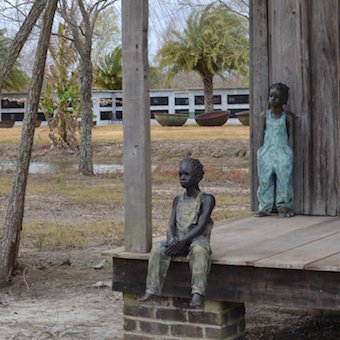Breaking The Bonds Of Silence: Touring The Whitney Slavery Museum

This week, Louisiana Eats celebrates Juneteenth—the day that commemorates the end of slavery in the United States.
We revisit our 2016 trip to the Whitney Plantation, the only plantation museum in Louisiana that focuses entirely on the lives of enslaved people. The vision for the museum originated with attorney and developer John Cummings, who invested millions of dollars to help educate the public about the truths of slavery in Louisiana.
The Whitney Plantation is one of three surviving Civil War-era sugar plantations located in St. John the Baptist Parish along the Mississippi River. There, we join Director of Research at Whitney Dr. Ibrahima Seck, who gives us a personal tour of the property.
We make our first stop at a restored nineteenth century Baptist church, where we learn about slavery as viewed through the eyes of children. Not far from the church, Dr. Seck brings us to a large monument engraved with names and information about the enslaved individuals who lived at Whitney. We also step into one of the site’s 22 cabins and tour the oldest detached kitchen in Louisiana, making our final stop at the big house where the Haydel family lived.
Following our visit to the plantation, we speak with Sybil Haydel Morial—educator, activist and former First Lady of New Orleans—who learned later in life of her family’s connection to the Whitney Plantation. Sybil chronicled her breadth of experience during the civil rights era and the years that followed in her memoir, Witness to Change.
For more of all things Louisiana Eats, be sure to visit us at PoppyTooker.com.
